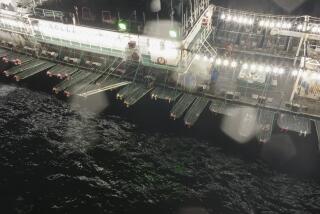How Dr. 360’s Plan to Die Took an Unexpected Turn
Lifeguard Tracy Geller and his eighth-grade surfing students had been riding waves off Manhattan Beach for about half an hour when his gut told him something wasn’t right.
All morning, Geller’s eye had been drawn to a glimmer in the water near a buoy about 150 yards offshore. At first, he thought the flashes of light were coming from a pod of dolphins. Then he wasn’t so sure. It looked more like a bodyboard that had drifted out to sea.
His curiosity verging on concern, Geller paddled out to investigate. There was indeed a bodyboard bobbing on the waves. But that wasn’t all: There was a man, face up, in the water. And the man wasn’t moving.
Paddling closer, Geller could see the man’s face. He was stunned: It was Dr. 360.
Everybody knew Joe Wolfson had cancer and figured that’s what would kill him. But this chapter of Dr. 360’s life had an ending that nobody could foresee.
*
Wolfson had moved to Manhattan Beach during summer break from UCLA in 1968 and never left. A bodysurfer, he was at the beach every day, the Pacific hurling his body toward shore like a human torpedo.
That changed three summers later when a neighbor whizzed past Wolfson, riding a wave on what looked like a chunk of Styrofoam. She called it a bodyboard.
Wolfson took it for a spin. On his first ride the surf pounded him face-first into the sand, eliciting howls from his friends on the beach, where he was seen as something of a ham. But he kept the borrowed board for hours, and realized a new passion.
Over the next two decades, Wolfson would emerge as a pioneer and premier figure in the bodyboarding world, winning numerous national and international competitions. Photos of Wolfson riding the big waves hang on the walls of Mac’s Liquors and Uncle Bill’s Pancake House, a Hall of Fame honor in this upscale South Bay town.
Wolfson became best known for creating the move that yielded his nickname. While riding atop a wave, he was the first to spin his board in a full circle--a 360.
Out of the water, Wolfson became just as well known in Manhattan Beach, where he served as the first chairman of the city’s Cultural Arts Commission and once ran for City Council. To most people, he was just that gregarious guy with the really long beard who seemed to be in the middle of everything.
Well known as he was, it was no secret that Wolfson, at 49, was dying of cancer.
He first noticed the cough last February, after spending a month at Casa 360, his Mexican beach house in Puerto Escondido. It seemed to come from deep within his lungs and it troubled him immensely. A nonsmoker and nondrinker, he was so fit he could bodyboard for 10 hours at a time.
Doctors treated him for asthma and operated on his sinuses, but the cough persisted. Chest X-rays revealed nothing. Finally, after Wolfson awoke in the middle of the night and coughed up enough blood to fill a bar glass, a CAT scan was ordered.
There, hidden between his lung and his esophagus, grew the tumor. A biopsy proved it was cancer. Because of its precarious position, it was inoperable.
Wolfson went on medical leave last October from his job of 30 years as a recreation official with the city of Carson. Determined to fight, he began to diet on the advice of a Chinese herbalist.
But the plan backfired. Wolfson, already thin, lost 12 pounds in three weeks, leaving just 122 pounds on his 5-foot-9 frame. For the first time in his life, he had no energy.
Then, on Veterans Day, Nov. 11, while having dinner with friends, he coughed up blood.
That night, Wolfson--who once told a sportswriter that “one day the only thing that will be left of me is a pair of shoes in the sand”--picked up his Dr. 360 signature model bodyboard and headed for the beach.
Under skies glittering with stars, Wolfson charged the surf, letting out his trademark high-pitched howls as the waves rolled in. He rode them for an hour, spinning multiple 360s on his final run.
He then paddled out into the darkness and, using the bodyboard’s leash, tethered the board--and himself--to the buoy. He leaned back on the board, clasped his hands on his chest, and went to sleep. In a note left behind for his roommate, Wolfson explained that if he were a cat and couldn’t eat or sleep, he would be taken to the vet to be put down.
Rescue at Sea a Close Call
Geller stared at the brown, foamy bubbles that covered Dr. 360’s mouth and saw that they were still. Wolfson wasn’t breathing. Geller pulled him onto his surfboard.
Fighting the urge to vomit, he pressed his lips to Wolfson’s, injecting two bursts of air.
Then the weight of Wolfson’s body shifted, tipping both of them off Geller’s surfboard and into the ocean.
It was no use screaming for help. He knew he wouldn’t be heard above the thundering waves his teenage students were riding to shore.
He was alone: No one had seen him paddle out to the buoy, or at least no one had paid any attention.
Geller managed to balance Wolfson on his surfboard once again and paddled toward shore. As he neared the beach, he let out a high-pitched whistle that caught the attention of some of his students. They helped Geller pull the limp man onto the sand.
Only when Geller pulled back the hood of Wolfson’s wetsuit did his students realize what he already knew: It was Dr. 360.
The students, many of whom had been lectured by Wolfson in the junior lifeguard program or had ridden bodyboards with him, began to cry. One student yelled, “Check his pulse!”
It was faint, but Wolfson had one.
Gave Away Money and Possessions
John Featherstone, head coach of the El Camino College football team and Wolfson’s roommate, raced to the Marine Street beach about two blocks from their apartment when he heard sirens and helicopters hovering.
He somehow knew the commotion had something to do with the envelope left sitting on his couch with the word “Feather,” the nickname Wolfson favors for him, penned across the front. He hadn’t even opened the letter. But somehow he knew.
Inside, in addition to the suicide note, he would later find a check for $5,000 to throw a party in Wolfson’s honor. The money was a fraction of the more than $100,000 Wolfson had jettisoned from his bank accounts over the past month, paying for two years’ tuition at UC Berkeley for a friend’s son, a generous wedding gift for two young friends, laser eye surgery for his girlfriend and about a half dozen other good deeds. He had also given away his car and his share of the jointly owned Mexican beach house.
After nearly six hours in the 59-degree ocean water, Wolfson’s core body temperature had fallen to 81 degrees. He lay unconscious and shivering uncontrollably in his hospital bed for hours. Then he awoke.
“I opened my eyes and I couldn’t talk and there were tubes running out of my mouth and my nose and my arms and I was immobilized,” Wolfson recently recalled. “I kinda laughed to myself and said, ‘No, this isn’t happening.’ ”
It was the very fate he had intended to avoid. Arms flailing, Wolfson tried to free himself from the tubes and get out of bed. He was finally tied down and given a morphine drip.
Wolfson was released from the hospital three days later, after a psychiatrist listened to his story and decided that he was not a threat to himself or others. But he seemed oblivious to the dozens of friends who came to visit at his 23rd Place apartment. He still wished he were dead.
Then came the letters.
There were 33 of them, one from each of the eighth-graders in the surfing class at New Manhattan Beach Middle School, where Geller teaches physical education. Most began, “Dear Dr. 360: You don’t know me, but I know you “ They went on to gush about what a great bodyboarder Wolfson is and how he is an inspiration.
Jared Segawa’s was fairly typical:
“Dr. 360: You’ve been a role model to me since I was a little kid. I loved to watch you ride the waves. It was incredible to see you doing your great tricks and famous 360 . Your great Yahoo! always cheered me up after a bad day. Right now I could just yell Yahoo! [for you] as loud as I could. Everyone cares about you and I especially do. Please don’t go.”
While each of the letters moved Wolfson, it was letters like the one from Alex Berg that, oddly enough, challenged him:
“I don’t know what to think after I helped you get out of the water this morning. There are a lot of stories about what happened today and I’m not really sure what to believe. Wow, I’ve never been so confused . It’s all I can think about.”
“I didn’t understand why I was alive until I read those letters,” Wolfson said. “Then I said, ‘OK, you made a big mistake here.’ It was the worst message in the world I could send them.”
But deciding to fight the disease was not so simple as changing his mind. His suicide attempt was not a whim.
“I felt that the tumor was telling me, ‘Your time is limited,’ ” Wolfson said, relaxing on his bed. “I started thinking about life and death. And one day I was sitting out at the buoy and I said, ‘This is perfect. This is my gravestone right here. Whenever I get to the point where I’m gonna have to dial 911, I’m gonna come out here and tie myself off to the buoy and this is where I’ll die.’ ”
He secured himself to the buoy, in part, because even though he welcomed death he did not relish the thought of his body being carried by the currents into deep water to be devoured by sharks. Nor did he want it to wash up on the beach tended by his close friend, lifeguard Mike Cunningham. In fact, he made sure that Cunningham was off the morning he planned to be found.
His only mistake was not knowing that the Veterans Day holiday forced the rescheduling of Geller’s surfing class from Wednesday to Thursday. Wolfson described what he thought would be his final moments this way:
“I went to sleep. My life didn’t flash before my eyes. There was no light at the end of the tunnel. All of those things that you see on TV shows and you read about--I didn’t experience any of that. I was just relieved and closed my eyes and said, ‘This is great.’ ”
Though not religious, he seemed to have faith in some sort of hereafter.
“You know what I wanted to do? I wanted to tell Jim Murray (the late Times sports columnist) about the home run race,” Wolfson said. Murray had died in August, as sluggers Mark McGwire and Sammy Sosa approached Roger Maris’ home run record.
“That was literally one of my last thoughts,” Wolfson said. “I’m going to get to see Jim Murray and I’m going to tell him what he missed.”
A Realistic Yet Hopeful Outlook
Wolfson’s answering machine recently informed callers, “You’ve reached the human Pop-Tart.”
A clear sign that he’s regained his sense of humor, Wolfson’s taped message referred to the radiation treatments he’s undergoing to shrink the tumor. He now welcomes the warm response of the beach community, which learned of his ordeal in the Easy Reader newspaper, a local weekly.
He’s back in the water, though he’s so thin that he has to wear a vest under his men’s small wetsuit, and he’s no longer immune to the ocean’s chill.
Wolfson still says he refuses to be kept alive by machines or die in a hospital room, tubes invading his body. But he will not attempt a second burial at sea. If the pain becomes too much again, he says, he may consider a legal assisted suicide in Oregon, or perhaps outside the country.
He remains coldly realistic about his condition, but there’s an underlying sense of hope that was not there before.
In his apartment, adorned with photos of him riding the waves that made him a legend, and filled with trophies from his various volunteer coaching ventures, Wolfson pulls out a large piece of black film and holds it to the light.
He points to a gray mass to the left of his esophagus. He said doctors have given the tumor a B designation, meaning it’s inoperable. His has been classified as a 3-B.
“Four is absolutely the worst tumor you can get,” Wolfson said. “3-B means just dig the grave a little slower.”
The dark humor, he said, is a way to relieve the tension.
“How else do you look at this? It’s there. I know it’s there. I’m doing everything I can to try and deal with it. Hopefully, I’ll be a miracle. I mean who is going to survive 5 1/2 hours in the ocean? Nobody thought that was possible either.”
More to Read
Start your day right
Sign up for Essential California for news, features and recommendations from the L.A. Times and beyond in your inbox six days a week.
You may occasionally receive promotional content from the Los Angeles Times.







